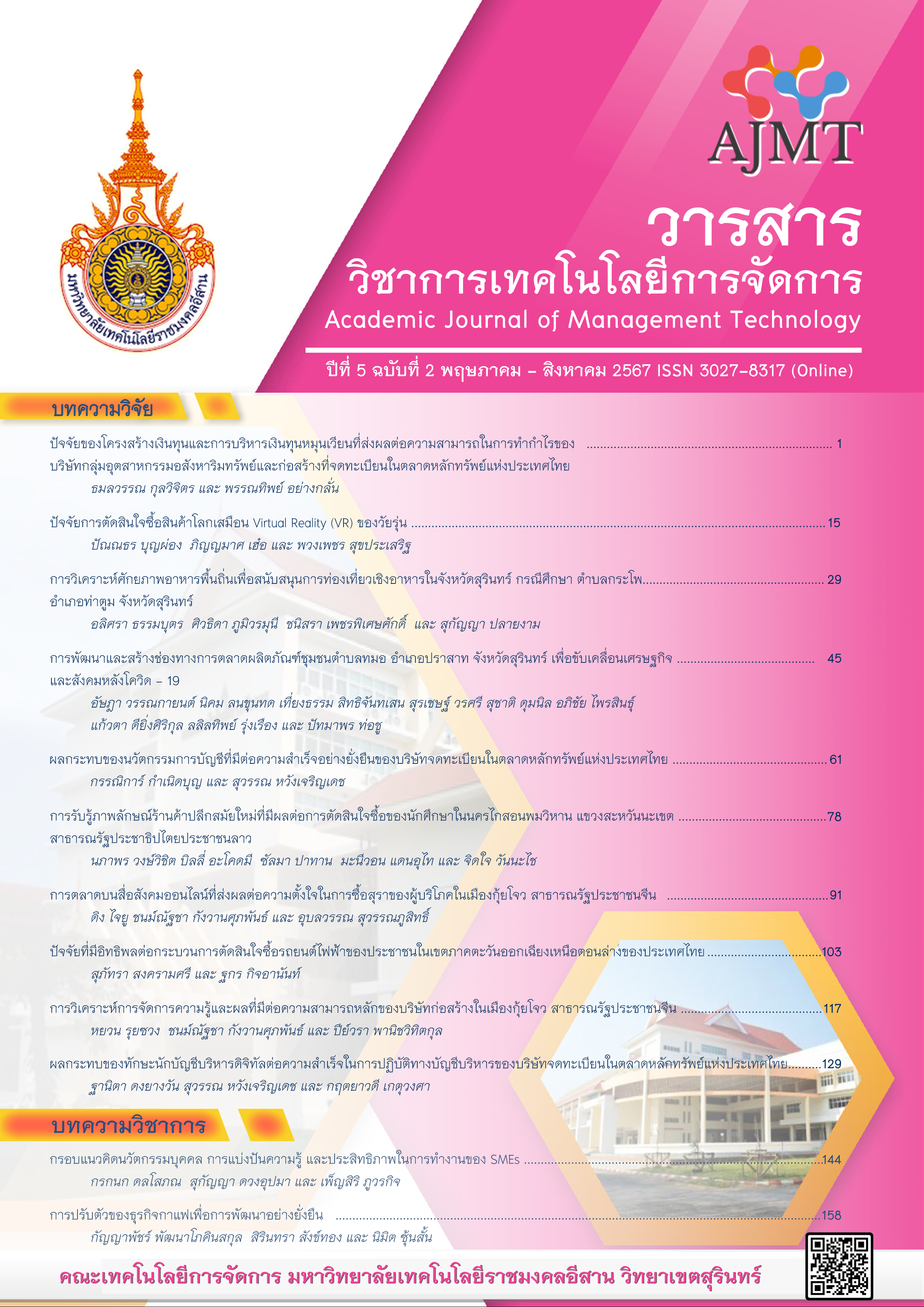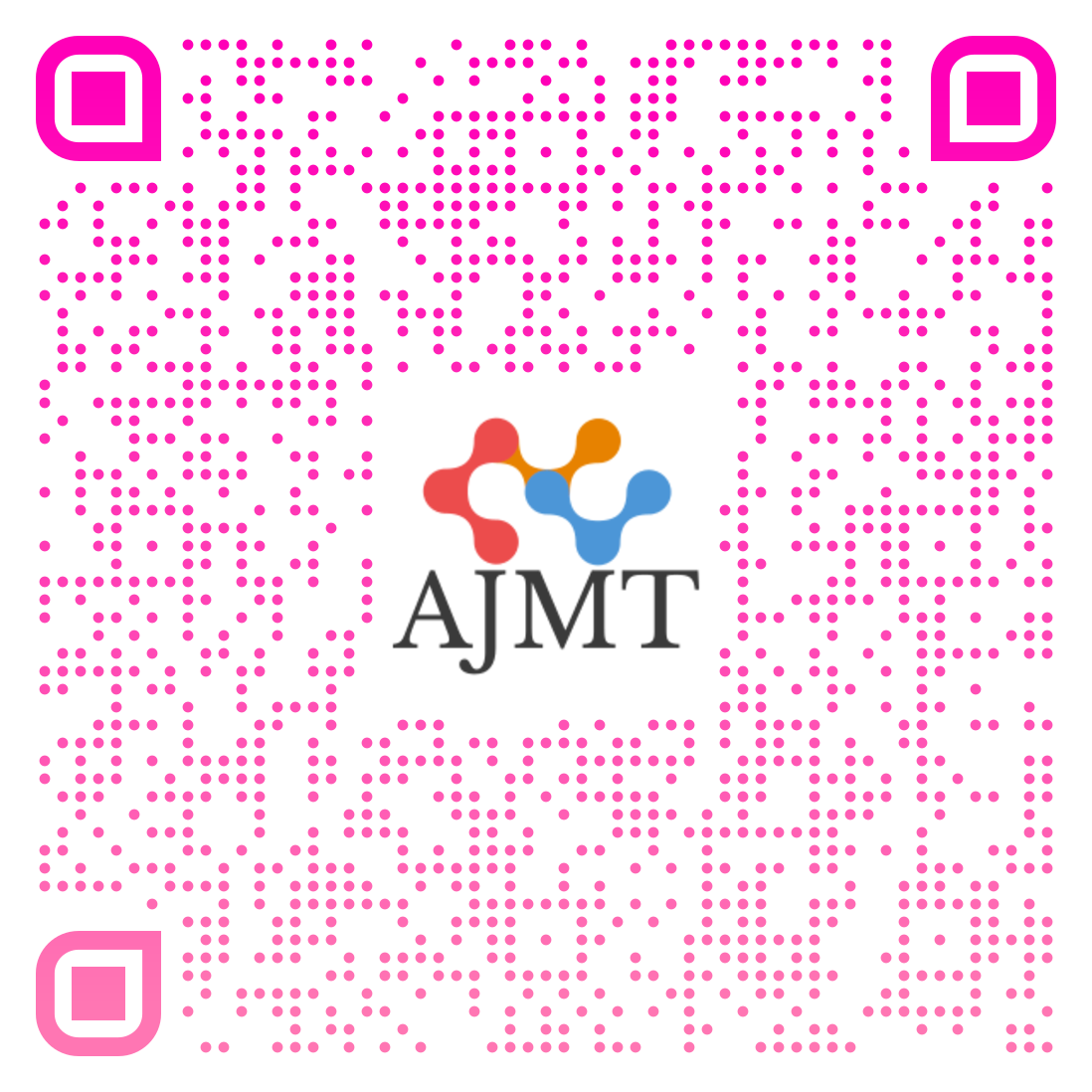ผลกระทบของทักษะนักบัญชีบริหารดิจิทัลต่อความสำเร็จในการปฏิบัติทางบัญชีบริหารของบริษัทจดทะเบียนในตลาดหลักทรัพย์แห่งประเทศไทย
DOI:
https://doi.org/10.14456/ajmt.2024.19คำสำคัญ:
ความสำเร็จในการปฏิบัติทางบัญชีบริหาร , ตลาดหลักทรัพย์แห่งประเทศไทย , ทักษะนักบัญชีบริหารดิจิทัลบทคัดย่อ
การวิจัยมีวัตถุประสงค์เพื่อศึกษาผลกระทบของทักษะนักบัญชีบริหารดิจิทัลต่อความสำเร็จในการปฏิบัติ ทางบัญชีบริหารของบริษัทจดทะเบียนใตลาดหลักทรัพย์แห่งประเทศไทย เก็บรวบรวมข้อมูลจากนักบัญชีบริหารดิจิทัลของบริษัทจดทะเบียนในตลาดหลักทรัพย์แห่งประเทศไทย จำนวน 269 แห่ง เครื่องมือในการวิจัย คือ แบบสอบถามสถิติในการวิเคราะห์ข้อมูล ได้แก่ การวิเคราะห์สหสัมพันธ์พหุคูณ และการวิเคราะห์การถดถอยแบบพหุคูณ ผลวิจัยพบว่า 1) ทักษะนักบัญชีบริหารดิจิทัล ด้านทักษะการใช้เทคโนโลยีสารสนเทศ ส่งผลกระทบเชิงบวกกับความสำเร็จในการปฏิบัติทางบัญชีบริหาร ด้านประสิทธิภาพการวางแผน และด้านการตัดสินใจที่ดี 2) ทักษะนักบัญชีบริหารดิจิทัล ด้านทักษะการเป็นคู่คิดผู้บริหาร มีผลกระทบเชิงบวกกับความสำเร็จในการปฏิบัติทางบัญชีบริหาร ด้านประสิทธิภาพการวางแผน และ ด้านการบรรลุเป้าหมายการควบคุม 3) ทักษะนักบัญชีบริหารดิจิทัล ด้านทักษะการเรียนรู้เชิงพลวัต มีผลกระทบเชิงบวกกับความสำเร็จในการปฏิบัติทางบัญชีบริหาร ด้านการตัดสินใจที่ดี รวมทั้งด้านการบรรลุเป้าหมายการควบคุม และ4) ทักษะนักบัญชีบริหารดิจิทัล ด้านทักษะและความรู้ทางวิชาชีพ ส่งผลกระทบเชิงลบกับความสำเร็จในการปฏิบัติทางบัญชีบริหาร ด้านการบรรลุเป้าหมายการควบคุม อย่างมีนัยสำคัญทางสถิติที่ระดับ 0.05 โดยตัวแปรอิสระ ทักษะนักบัญชีบริหารดิจิทัล ด้านทักษะการใช้เทคโนโลยีสารสนเทศ ด้านทักษะการเป็นคู่คิดผู้บริหาร และด้านทักษะการเรียนรู้เชิงพลวัต คิดเป็นร้อยละ 31.29 ทั้งนี้ผู้บริหารฝ่ายบัญชีของบริษัทสามารถนำผลการวิจัยเป็นแนวทางการเพิ่มประสิทธิภาพได้
เอกสารอ้างอิง
Aaker, D. A., Kumar, V., & Day, G. S. (2001). Marketing research (7th ed.). John Wiley and Sons.
Lailuan, A. (2021). Studying the impact of changes in digital technology that occur on Work and departmenta
l structure of the financial accounting department, case study A listed company on the stock exchange of Thailand agro-industrial and food business group. Faculty of Commerce and Accountancy, Thammasat University.
AlAnsari, A., Alqadhi, A., Aljawder, A., & Wadi, R. A. (2022) Management accounting in the digital era: Literature
review. In Abdalmuttaleb, M. A., & Musleh, A. (Eds.), Artificial Intelligence for Sustainable Finance andSustainable Technology Lecture Notes in Networks and Systems (pp. 512-521).
Bhimani, A. (2020). Digital data and management accounting: Why we need to rethink research methods.Journal of Management Control, 31(1), 9-23.
Srisa-at, B. (2010). Basic research (8th ed.). Suviriyasan.
Choengram, O., Taewchoho, T., Hemmara, C., Chiangnar, S., Poowadin, P.,& Waiyawout, K. (2023).Navigating risk management in modern organizations : The impact of transformative digital technology. Academic Journal of Management Technology, 4(2), 239-250.
Chuaphanich, P. (2017). The role of accountants in the digital transformation era. Professional Council Newsletter Accounts Under Royal Patronage, 72(2), 18.
Chuasrisakul, T. (2020). Important skills and technology for management accountants. Member of the professional committee accounting: Management accounting. https://www.tfac.or.th/Article/Detail
Chunhavajira, P. (2018). Stepping into the accountant of the future world. Newsletter From the Federation of Accounting Professions Under His Majesty the King Rajapatpatam, 71(2) ,19.
Hair, J. F., Black, W. C., Babin, B. J. & Anderson, R. E. (2010). Multivariate data analysis (7th ed.). Prentice Hall.
Karitu, B. & Namusonge, M. J. (2019). Entrepreneurial decision making styles and the growth of small medium-sized manufacturing enterprises in Nairobi, Kenya. Journal of Business and Change Management, 6(3), 132-144.
Krejcie, R. V. & Morgan, D. W. (1970). Determining sample size for research activities. Educational and Psychological Measurement, 30(1), 607-610.
Linjee, C., Homkaew, K., & Boon-Iam, S. (2020). Knowledge and professional skills of accountants at the certifiedaccounting practice in Thailand. Journal of Arts Management, 4(1), 34-40.
Mangsa, N. & Prommarat, P. (2022). Dynamics learning skill that affect the effective work of accounting practitioner of affiliate subdistrict administrative organization in Roi Et Province. Journal of Management and Development, 9(2), 49-66.
Mangsingh, R. & Rodjam, C. (2021). Desirable accountant competencies in the digital age according to educational standards international for accounting professionals. Journal of Innovation and Management, 6(1), 100-118.
Metsuwan, M., Janjarasjit, S., & Gatewongsa, K. (2019). Relationship between continuous professional knowledge development and the quality of assurance services of auditing professionals in Thailand. Journal of Accounting and Management, 11(3), 179-189.
Nadee, P., Konpan, T., Matarad, K., Natan, T., Tassanabanlue, T., Kuleesungnean, P., Trongwattanawut, S.,Teankrajang, B., Wangpat, B., & Phoothongking, S. (2021). The digital accountants competency: Adaptive skills in a transformed world. Journal of Liberal Arts and Management Sciences, 8(2), 19-32.
Namsn, M., Poonpool, N., & Jirawuttinunt, S. (2020). The effects of information technology skills on effectiveness of accounting information services of small and medium enterprises accountants in the Northeast. Journal of Accounting and Management, 12(2), 71-86.
Natenooch, J. (2022). The Impact of the technological changes toward the accountants development in the digital age. Journal of Humanities and Social Sciences Rajapruek University, 8(1), 1-18.
Obi, J. N. & Agwu, E. (2017). Effective decision-making and organizational goal achievement in a depressed economy. International Journal of Research and Development Studies, 8(1).
Panturee, W., Pongwiritthon, K., Wajesuwan, R., Kamjai, K., & Songtai, S. (2022). Application of managerial accounting affecting the success of construction business organizations of small and medium enterprises in the Northern Region of Thailand. Journal of Corporate Management and Local Innovation, 8(4), 173-185.
Phonpipatkul, W. (2020). Management accountants in the digital age. https://www.tfac.or.th/Article/Detail/126283
Phosrichan, N. & Petchprai, S. (2022). Effect of proactive managerial accounting information implementation on firm performance of SMEs in Nakhon Phanom Province. Journal of Liberal Arts and Management Sciences, 9(1), 19-30.
Prapaisri, P. & Nantaphan, K. (2020). Professional development guidelines for accounting professionals in the digital age. Journal of MCU Nakhondhat, 7(12), 422-435.
Puengklay, P. (2020). The application of management accounting affecting the success of construction business organizations in Bangkok metropolitan region. Sripatum University.
Rakpakdee, W., Sirisom, J. & Musik, N. (2018). The relationship between the continuous development of knowledge and the performance of savings cooperative accountant in the Northeastern Region. Journal of Accounting and Management,10(1), 186-196.
Ratanasongtham, W. (2022). Impact of best management accounting practice on operational excellence outstanding, decision making effectiveness and sustainable business growthof auto parts businesses in Thailand. Journal of Accounting and Management, 13(3), 211-227.
Saetao, J., Tontiset, N., & Prempanichnukul, V. (2021). The relationship between accounting professional skills in the digital age and success in work of accounting executives of listed companies on the Thailand. Journal of Management science Udon Thani Rajabhat University, 3(5), 22-35.
Sriviroj, S. & Aiamchuen, K. (2019). Accountants in the 4.0 era. EAU Heritage Journal Social Science and Humanity, 9(1), 19-28.
Tairuakham, S. (2009). Research methods for the humanities and social sciences (8th ed.). Mahasarakham University.
Yu, B. & Raksong, S. (2019). Rational decision making and firm performance: Empirical evidence from SMEs in Thailand. Panyapiwat Journal, 11(3), 163-177.
ดาวน์โหลด
เผยแพร่แล้ว
รูปแบบการอ้างอิง
ฉบับ
ประเภทบทความ
สัญญาอนุญาต
ลิขสิทธิ์ (c) 2024 คณะเทคโนโลยีการจัดการ มหาวิทยาลัยเทคโนโลยีราชมงคลอีสาน วิทยาเขตสุรินทร์

อนุญาตภายใต้เงื่อนไข Creative Commons Attribution-NonCommercial-NoDerivatives 4.0 International License.
บทความที่ได้รับการตีพิมพ์เป็นลิขสิทธิ์ของคณะเทคโนโลยีการจัดการ มหาวิทยาลัยเทคโนโลยีราชมงคลอีสาน วิทยาเขตสุรินทร์
ข้อความที่ปรากฏในบทความแต่ละเรื่องในวารสารวิชาการเล่มนี้ เป็นความคิดเห็นส่วนตัวของผู้เขียนแต่ละท่านไม่เกี่ยวข้องกับคณะเทคโนโลยีการจัดการ มหาวิทยาลัยเทคโนโลยีราชมงคลอีสาน วิทยาเขตสุรินทร์ และคณาจารย์ท่านอื่นๆในมหาวิทยาลัยฯ แต่อย่างใด ความรับผิดชอบองค์ประกอบทั้งหมดของบทความแต่ละเรื่องเป็นของผู้เขียนแต่ละท่าน หากมีความผิดพลาดใดๆ ผู้เขียนแต่ละท่านจะรับผิดชอบบทความของตนเองแต่ผู้เดียว










